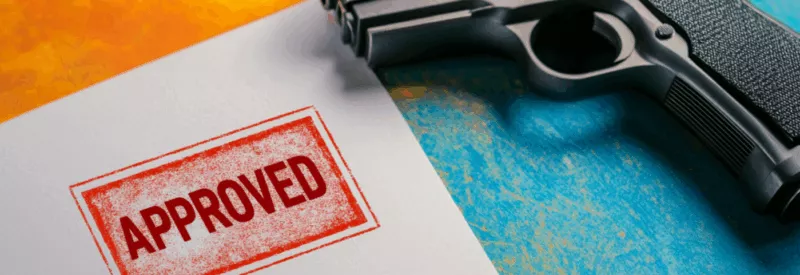While acquiring an FFL in Massachusetts doesn’t come without complications, it’s ultimately within reach for state residents. While not exactly the most firearm-friendly state in the nation, Massachusetts is home to its fair share of gun owners. In other words, acquiring an FFL in the Commonwealth of Massachusetts is more doable than in a state like Hawaii, where the gun ownership rate is lower.
Below, we’ll walk you through the steps of becoming a licensed firearm dealer in Massachusetts. We’ll discuss price options, federal and state requirements, the different kinds of FFLs you can apply for, and the business model that best suits your needs. Let’s get started.
Getting a Massachusetts FFL: An Introduction

Those hoping to start a business selling guns and ammunition, even online, will need to know how to properly define an FFL. An FFL, better known as a federal firearms license, is legal documentation that permits individuals to buy, sell, transfer, import, and trade in firearms and ammunition by United States law.
While we wouldn’t say that getting an FFL is a complicated process, there are steps that one must follow diligently and much to consider, from practical requirements to license costs, to how factors like dealers, gun trusts, and firearms certification will affect your operation.
Anyone applying for an FFL in Massachusetts must adhere to certain rules. State and federal gun laws dictate that merchants must prove they are competent enough to sell goods in an industry that many consider high-risk. The acquisition of added permits and licenses must also be considered.
1. Meet All of the FFL Requirements
The first step in securing an FFL in Massachusetts involves meeting all the basic requirements. Once you’ve checked those boxes, you can start your application. After all, you wouldn’t want to waste time and effort on an application if there’s no chance of it getting approved.
The ATF, or Bureau of Alcohol, Tobacco, Firearms, and Explosives[1]ATF. “ATF”. Accessed on July 1, 2024., are technically in charge of implementing the federal requirements for every merchant who wishes to obtain an FFL. If merchants fail to qualify at the federal level, they will also fail to be eligible at the state level.
Each state has its own mandates for this sort of thing, independent of what is required federally. You’ll also want to look into the nuances of local and zoning requirements, which we’ll get into later.
Next, we’ll examine the various requirements (federal, state, and local/zoning) that will help determine whether or not you qualify for a Massachusetts FFL.

Federal requirements
The ATF establishes the federal mandates for obtaining an FFL in Massachusetts. These mandates extend to your age, any criminal history, mental health competency, residency details, and any history with narcotics, among other factors. Ensuring that you meet these stipulations will determine whether you qualify for a federal firearms license.

State requirements
In addition to the conditions set forth by federal law, Massachusetts has implemented additional state-level prerequisites. Said prerequisites fall into two categories: licensing requirements and registration requirements. We’ll go over them below.
State Firearms Dealers License
Massachusetts is unique in that it requires firearm merchants to not only possess an FFL but also a firearms dealer license. So, what is a firearms dealer license? Unlike an FFL, which can be filled out digitally, a firearms dealer license is a paper application that, once completed, must be formally submitted to the merchant’s local police department. In addition to completing and submitting the form, merchants must be fully transparent about why they are requesting a firearms dealer’s license (this includes listing two personal references). We encourage anyone applying for a Massachusetts FFL to get familiar with their state licensing requirements before formally submitting any paperwork[2]Mass.gov. “Information for firearms dealers | Mass.gov” Accessed on July 1, 2024..
Massachusetts Instant Record Check System (Seller Side)
In addition to ancillary licensing, Massachusetts requires that all firearm sales transactions pass through the state’s Instant Record Check System, or MIRCS.
Massachusetts Gun Portal (Customer Side)
Regarding buyers, the Massachusetts state government has declared that “gun owners are required by law to report ALL private sales, transfers, and surrenders of firearms to the Massachusetts Firearms Records Bureau via the Massachusetts Gun Transaction Portal.”[3]Massachusetts Department of Criminal Justice Information Services. “Massachusetts Gun Transaction Portal”. Accessed on July 1, 2024..
Business Registration Requirements
Massachusetts requires residents to register their firearms business with the state. This is standard procedure for any territory where a merchant wishes to buy and sell weapons and ammunition[4]Mass.gov. “Starting a business in Massachusetts | Mass.gov” Accessed on July 1, 2024.. If, for whatever reason, you own and operate a firearms business in another state, you must still register in Massachusetts if you wish to sell your merchandise within the borders of that state.

Local and zoning requirements
This is a critical part of the process in terms of getting your FFL. It’s especially true in Massachusetts, which is not a state that grants licenses or permits to home-based FFLs. Massachusetts gun merchants must own a brick-and-mortar retail location to conduct business according to state law; it is also worth mentioning that said location may not be the merchant’s residential or home address[5]Mass.gov. “Information for firearms dealers | Mass.gov” Accessed on July 1, 2024..
This rule has a handful of exceptions, mostly involving curios and relics. Generally speaking, however, home-based firearms businesses are not a thing in Massachusetts[6]ATF. “Curios & Relics | Bureau of Alcohol, Tobacco, Firearms and Explosives” Accessed on July 1, 2024..
2. Select the Type of FFL You Need
Let’s say you’ve passed all state, federal, and local requirements and are one step closer to becoming a Massachusetts-based firearms merchant. Now, it’s time to discuss which type of federal firearms license will best suit your needs.

FFL license types
Regarding FFL license types in Massachusetts, there are nine options to choose from. Each exists to serve different business models. To determine which FFL license best suits you, consider the following:
- Firearm Type: Certain (i.e., specialty/high-powered) firearms will require a different category of FFL. Consider how a more rarefied inventory might influence the specific license you intend to apply for.
- Business Plan: Ask yourself the following: How do you plan to manage your storefront? Do you have your FFL merchant account set up? How do you intend to deal with chargebacks? Will you be importing firearms or working on the manufacturing side of things? How will you utilize the services of firearms dealers? What methods of payment will you be offering your customers? Understanding the answers to these questions is the most foolproof method of determining which FFL best suits your needs.
3. Complete an Online FFL Course
The firearms industry is one defined by myriad rules and regulations, where background checks and waiting periods are the status quo. It is also an industry that is constantly shifting and changing. Therefore, it is of the utmost importance that Massachusetts firearms merchants are prepared to sell and well-versed in all facets of the industry. Completing an online FFL course is the easiest way to ensure you stay on top of all relevant firearm-related updates. To be honest, there are plenty of top-tier online firearms courses to choose from. Be sure to spend some time on Google and give some thought to the question of which option best fits your learning style.
While we highly encourage online courses, this part of the process is not mandatory. However, we still recommend exercising this option. Why? Simply put, it gives sellers a competitive edge. Consider it as doing extra credit: it’s not a requirement, but staying knowledgeable and prepared certainly doesn’t hurt.
4. Apply for Your Massachusetts FFL
You’ve made it this far. Congrats! Now, it’s time to submit your application. This part of the process is non-negotiable and must be completed in full for the merchant to acquire a federal firearms license properly.
First, you will submit a background check for an ATF representative to review. Once you’ve completed this step, you will pay the obligatory fee before submitting your application. Per your application, you’ll want to include:
- Completed application form (ATF Form 7/7CR).
- Fingerprints are used for conducting a criminal background check.
- Photographs, which an ATF official will use to identify your specific FFL license.
- Proof of registration and state certification. This includes your firearms dealer’s license and local business license.
- Any necessary supplemental documentation. This can include information about additional managers or business owners.
5. Have an Interview with a Representative from Your Regional ATF Office
Once you’ve passed your background check and your application has been processed, you will receive a response from an Industry Operations Investigator, or IOI. The IOI will contact you from your local office. You will then agree upon a time to meet and discuss your business model.
You can’t get an FFL in Massachusetts without completing this step, so prepare accordingly. This is an opportunity for you to explain how your business will fit into the fabric of the surrounding local area. This part of the process is where an agent will either approve or deny your request for an FFL, so be sure your pitch is persuasive.
FFL License Costs in Massachusetts
True to the first “F” in FFL, FFL license costs are regulated at the federal level. The regulations are the same in all fifty states, including Massachusetts. An FFL costs anywhere from $300 to $3,000, depending on the license type. Remember, the prices we’ve just cited are for standalone application fees. In other words, they do not encompass the cost of renewing your FFL.
Getting a Federal Firearms License in Massachusetts: Closing Thoughts
For those actively pursuing a federal firearms license in Massachusetts, we have good news. While the process is not without complexities, locking down an FFL in the Bay State is actually quite doable. In conclusion, while there are additional local and state regulations to consider beyond what is required at the federal level, these conditions are relatively easy to navigate compared to other, less gun-friendly states. Again, the only exceptions are home-based FFLs, which are still illegal in Massachusetts.
For further assistance in securing the proper licensing for gun and ammunition sales, consider partnering with a merchant services provider with a history of lending aid in industries that have been historically deemed high-risk.
All Businesses Deserve a Chance.
We can approve almost any business type.
Approval rating.
FFL Massachusetts FAQs
We hope this article has been helpful for those looking to break into the firearms industry. Let’s look at the most commonly asked questions we receive about Massachusetts-based federal firearms licenses.
Do I need an FFL in Massachusetts?
In simple terms, if you plan to partake in the importing, manufacturing, or selling of firearms, you will need an FFL license to conduct business in Massachusetts.
Who can apply for an FFL in Massachusetts?
Anyone who meets the requirements established by the federal government can apply for an FFL in Massachusetts. To apply, you must be at least 21 years old and be either a legal citizen or permanent resident of the United States. You must also have a record free of felony convictions.
Do I need to register as a business to get a Massachusetts FFL?
Yes, you must transfer your business registration to Massachusetts to successfully do business within the state. This is a requirement for all businesses, not just FFLs. If you have a federal firearms license registered in another state but are moving to Massachusetts, you must re-register your business upon arrival.
How can I find an FFL dealer in Massachusetts?
A few methods exist for locating a federal firearm license dealer in Massachusetts. Arguably, the easiest way involves using the ATF’s online search option. To do this, enter your residential zip code, click License Types, and select “Firearms.” Once you’ve done this, you’ll have a list of local, licensed FFL holders. A more feet-on-the-ground option would involve visiting shooting ranges and/or local gun shows and asking around. Many of the folks you’ll encounter at these sorts of places may have connections to FFL dealers. Inquire with friends or fellow firearm savants who may know a dealer in your area.
Can you have a home-based FFL in Massachusetts?
No, you cannot. Massachusetts is one of the few states where you must have a designated brick-and-mortar location whose sole purpose is to serve as the primary site of your firearms business. In other words, home-based FFLs are a no-go in this part of the country. Moreover, firearms merchants cannot use a residential dwelling or home as a substitute for any kind of traditional retail outlet.
Can I apply for an FFL with a Massachusetts gun trust?
A gun trust is in no way synonymous with individual gun owners, merchants, or dealers. Unfortunately, it is not possible to legally apply for a federal firearms license with a Massachusetts gun trust.
Does the BATF&E have requirements for an FFL in Massachusetts?
As we mentioned earlier, the BATF&E is the organization in charge of establishing and enforcing the federal-level FFL requirements. State and local officials then implement additional requirements as they see fit.
Do I need to apply for an SOT for my Massachusetts FFL?
The answer to this question largely depends on the type of business you wish to start. Merchants planning to sell NFA items (a category that includes specialized weaponry) will have to apply for a Special Occupational Taxpayer license. You’ll do this after you’ve received your official FFL number.
How long does it take to get your FFL in Massachusetts?
This process can take some time. The firearms industry is nothing if not detail-intensive: regulations, background checks, online courses, etc., and so forth. However, once you’ve submitted your completed application, you can expect a yes or no response within a 60-day timeframe.
How can I transfer an FFL in Massachusetts?
An FFL stays with the original applicant. This means that transferring an FFL is not a viable option for Massachusetts residents. However, the exception would be the license itself changing hands, which can occur if you retire or sell your business.
How much does an FFL transfer cost in Massachusetts?
The cost of a firearm transfer in Massachusetts will typically run the merchant somewhere between $20 and $200. That said, the FFL transfer itself is contingent on several external factors. The price is relative to the company overseeing the transfer, as well as firearm type and related auxiliary fees.
How hard is it to get an FFL in Massachusetts?
While there are some additional steps in terms of acquiring a federal firearms license in Massachusetts, it’s still a gun-friendly enough state that acquisition of an FFL is ultimately within reach for many business owners. Follow the steps we’ve outlined, be patient, and prepare, prepare, prepare.




